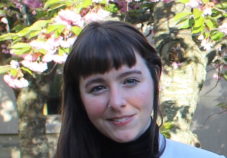
Emelia Williams
Title
Open Environmental Data Project Civic Science Fellow
Year
2021
Project focus: Emelia will focus on the open data and governance ecosystem, working collaboratively to identify and articulate new strategies for data usability, governance, and inclusiveness in practice.
About Emelia
Emelia Williams (she/they) is a public policy researcher with expertise in how citizens and government respond to environmental, energy, and climate crises. Currently, she is the Policy and Research Associate at the Open Environmental Data Project (OEDP), where she is working to translate policy and research on environmental data to inform civic pilots and prototypes. She is particularly interested in learning how to design more inclusive systems for community use of environmental data and using futures-thinking to imagine a better environment (physically, socially, politically). She has held research roles spanning the gamut of environmental topics including deep decarbonization, clean energy access, and proforestation at MIT, the Woodwell Climate Research Center, and Sustainable Energy for All. Emelia completed a master’s degree in environmental and climate policy from the Fletcher School at Tufts University and a B.A. in environmental science and international studies from Centre College.
OPPORTUNITY AND DESIGN BRIEF RESEARCH: HTTPS://WWW.OPENENVIRONMENTALDATA.ORG/RESEARCH-TYPE/ OPPORTUNITY-BRIEFS PUBLICATION IN FRONTIERS IN CLIMATE: HTTPS://WWW.FRONTIERSIN.ORG/ARTICLES/10.3389/FCLIM.2022.785269/FULL
BRIEF ON DIGITAL RIGHTS AND ENVIRONMENTAL AND CLIMATE JUSTICE: HTTPS://WWW.FORDFOUNDATION.ORG/MEDIA/7342/ OEDP-AND-OC-ENVIROMENTAL_01-07-22.PDF
1. What was the focus of your work as a Civic Science Fellow? What did you do?
The focus of my work as a Civic Science Fellow was to research and model systems for community
governance. I designed a research plan, organized Brain Trusts (focus groups), led interviews,
performed desk research, and synthesized this information into four opportunity briefs over the
course of the fellowship. The topics included environmental data as a public good, local planning and
environmental data as civic voice, using data beyond original intent, and collaboratively managed data.
I worked on and eventually sunsetted OEDP’s work with SIDE events. I added to our conceptualization
of a community governance model called Community Data Hubs, and fundraised $100k to continue
the work with partners, coordinating a working group, and leading design sessions. I also completed
research on digital rights and data reusability for environmental and climate justice communities.
2. How do you hope your work as a Fellow will influence the future—for yourself, an organization, a community, or a field?
I hope my work added to the nascent field of environmental data with several original research pieces and hopefully, the continuation of a community of practice. I hope that the ideas that I have socialized in research and network building will take root in the policy culture of the field. I hope my work furthered the mission of Open Environmental Data Project, especially in demystifying data as a powerful source of evidence for communities and their interactions with local decision makers, and that ultimately, environmental and climate injustices are addressed with policy and action that leverages open environmental data. My work as a fellow has influenced my future in that I have expanded my areas of knowledge, my understanding of the intersections of multiple fields, and grown my own personal network. I have learned about ways I can apply creative methods to tried and true policy methods to see what kind of futures we can design.
3. What’s one insight you’d share from your work as a Civic Science Fellow?
Responding to overwhelming and complex issues is always easier with a team of people who all think a little bit differently.